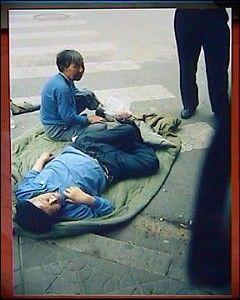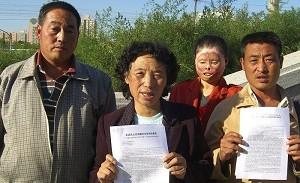According to a report released by the Chinese Ministry of Public Health in 2005, suicide has become the fifth leading cause of death in China. In 2005, approximately 250,000 people committed suicide, and 2.5 to 3.5 million people attempted suicide. Since one fifth of the world’s population resides in China, the number of people who committed suicide in China in 2005 is equal to one quarter of those who committed suicide around the world.
At present not only are there are no organizations providing psychological treatment to those at risk of suicide in China, the government even charges people for attempting suicide in public locations. For instance, during the second hearing of Beijing resident Ye Guoqiang, who jumped into the Jinshui River near Tiananmen Square in 2004, an officer of the Supreme Court asked, “Your attempted suicide in the Jinshui River disgraced the nation. If you wish to die, why don’t you just hang yourself in the privacy of your own home?”
Ye Guoqiang is the younger brother of the renowned Beijing human rights activist Ye Guozhu. In May 2003, the government demolished all of their extended family’s houses in the Xuanwu District of Beijing, and three generations of the family were forced to relocate. This moment was captured truthfully in the picture of their elderly parents being thrown into the streets by authorities as their mother looks despairingly at the demolished house.
Since then, the two brothers have been protesting against the forced relocation and were subsequently jailed in Tianjin. Ye Guoqiang was sentenced to two years in prison for attempting suicide in the Jinshui River on October 1, 2004. On the other hand, Ye Guozhu was sentenced to four years for appealing on behalf of other residents and requesting a permit for a 10,000-person march on Tiananmen Square.
Ye Guoqiang’s attempted suicide was reported widely by both the Chinese Communist Party (CCP) and overseas media. However, the content of the reports was very different. On July 18, 2006, in recollecting the court hearings, Ye Guoqiang said, “Gao Zhisheng had agreed to be my defense attorney very early on. However, the National Security Police and the government refused to tell him where the hearing was taking place. Therefore, two hearings had passed before Mr. Gao found me. The first hearing was held in the Beijing intermediate court. The case was then brought to the Supreme Court after we rejected the court’s initial decision. My lawyer was one appointed by the government. During the trial, no one else was present besides a few city officials and seven or eight city representatives. The hearings were purely a fraud.”
Embarrassment to the Country
Ye Guoqiang continued to say, “During the second trial the Beijing lawyer argued ‘It is a crime for one to commit or attempt suicide in the Jinshui River because it is an embarrassment to the country. However, if you do so in the privacy of your own home, then it is not a crime. After all, if you want to die, it is your choice and should be done on your private property.’ Don’t you think that this is pathetic logic? What can citizens do to the Communist Party? At first, my hope was strong, thinking that no matter what, the Communist Party was still good. However, I see the truth now: it cannot be saved anymore—it is corrupt from the roots.”
“Beijing’s police are also quietly cursing the CCP. They have no choice but to obey the CCP’s commands. They say ‘We are dogs—we bite whoever the Communists want us to because we’re paid.’”
After the jail term, Ye Guoqiang still appealed constantly at various locations. He has become one of the police’s main subjects for monitoring. During the Chinese People’s Consultative Political Conference in 2006, Ye Guoqiang avoided the police’s monitoring and arrived at Tiananmen Square only to be arrested again. Afterwards, he was monitored and restricted by eight police and security guards at all times.
The Ye brothers’ 81-year-old mother recently died from cancer. Ye Guoqiang pleaded with the police to fulfill his mother’s dying wish of seeing her son one last time. The station denied even this request.
In another attempt, on July 17, Ye Guoqiang submitted a request for a parade to the Beijing police station, asking permission to protest; the police station refused his request at first sight.




